Do you want to do link building but don’t know where to start?
This guide will tell you how to create backlinks for your website, with actionable tips.
Contents:
Link-Building Concepts
In this section, I will write about the fundamentals of link building, what it means, and why it is important for your website’s rankings in search engines.
Are you ready? Let’s dive in.
What Is Link Building?
Link building consists of creating backlinks from other websites to yours to boost visibility on search engines.
However, not all links have the same value.
With the Penguin’s algorithm update, Google is now focusing on link quality (not link quantity).
Link building includes several techniques, including content marketing, guest posts, email outreach, and others.
Why Is Link Building Important for SEO?
There are several reasons why you should care about it.
Google states that links can help you rank better on search engines:

Also, dofollow links (either external or internal) can help Google crawlers discover new pages on your site.
But wait – there’s more.
Andrey Lipattsev (now Partner Development Manager for Google, but Search Quality Strategist before that) stated that links, content, and RankBrain are the top three ranking signals in Google’s popular search algorithm.
But it was not always like that.
In the past, the search engines that dominated the market were Yahoo! and AltaVista. And they always ranked results only by considering the content of web pages.
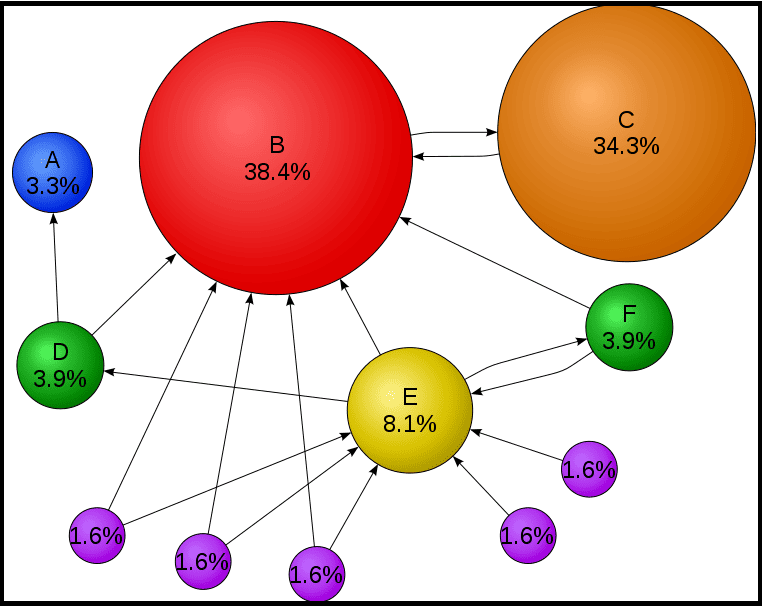
Then came Google with the PageRank Algorithm and changed the rules.
Instead of only analyzing pages based on content, the system also considered how many websites were pointing to that page.
💡 In a nutshell, the number of links is important, but you should also focus on quality, not quantity.
So, how can you determine the quality of a link?
Let’s talk about it.
Link Quality Analysis
There are different link metrics you should know. They can help you verify the value of a link and judge whether you should work on it.
Being aware of these SEO metrics is also useful for analyzing the link profile of a website. In addition, several attributes change the value of the link itself in terms of rankings.
Considering that there are no exact statements from Google about the measurement of each link, here are some indications that prominent members of the SEO community use:
Authority
Verifying domain authority (DA) is one of the most popular ways to understand, at a glance, how strong a website is.
This metric was introduced by Moz and ranges from 0 to 100, where 0 is the lowest value.
To calculate the domain authority, Moz uses several factors, such as the unique links pointing to the main domains and the total number of links.
Let’s make an example to better understand this concept.
Sometimes, you will be able to acquire a link from an existing page on a website instead of being mentioned on a new page.
Think of a list of the best New York bakeries where you can include your business.
In this case, you will want to evaluate how strong the page in question is, to check whether you should take your time to acquire that link.
To do so, use the free Moz domain authority checker to get the data you need.
If you see metrics such as a good DA, lots of quality linking domains, and tons of ranking keywords, then the link may be worth pursuing.

But wait, there’s more.
Page Authority is another metric created by Moz (very similar to Domain Authority). It differs because it applies to a single page and not to the entire domain.
Similar to Moz, Ahrefs, and SemRush are also using their metrics to evaluate a domain authority. While they can differ in the specific factors they use, the concept is the same.
The authority of a website or page is calculated based on the number of referring domains (quantity and quality) linking to it, together with other sub-metrics such as follow vs. no-follow links, referring IPs, and referring subnets.
💡 To sum up, if you could get a link from a new blog recently opened by your friend or one from Forbes, which one would you choose? I think the answer is clear.
Relevance
You want to get links from authority sites, but you also need to consider the topic’s relevance.
Consider this example.
You have a blog about fitness, and you publish a review about the best exercise equipment. Thanks to this, two sites mention your new article in their content. One from their blog post “The Best Fitness Tools” and another from an article titled “10 Ways to Save Money in Your Business“.
Which of the two pages seems most relevant to your website, according to Google?
That’s right. That page will benefit your site more in terms of rankings.
Relevance is also considered at the website level. In fact, Google states:
If other prominent websites on the subjects link to the page, that’s a good sign that the information is of high quality.

💡 Put simply, try to earn links from websites connected to your site instead of seizing every linking opportunity, whatever topic it is.
Positioning
The position of a backlink you earned inside a specific web page matters.
- Is it at the beginning of the content?
- Or deep down, at the end of the page?
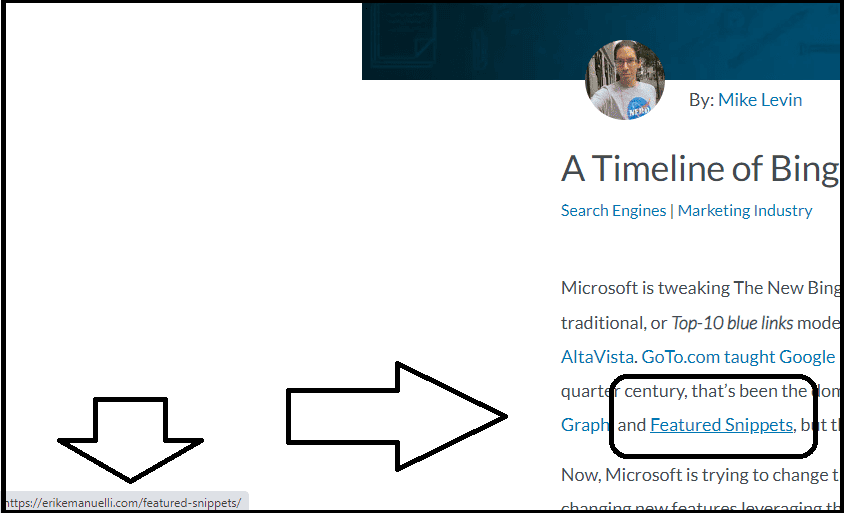
✅ The higher it is, the better.
Of course, with white-hat link-building strategies, you don’t have control over the positioning of the backlink.
But if you do, for example, with guest posting.
So, try to place your link within the first part of the content.
This strategy also serves to increase the SEO value of that link because you will have a better chance of receiving referral traffic.
Destination
When you can decide where your link goes, there are three possibilities. You can usually link to the:
- Homepage of your site
- Pillar posts of great value
- Pages that are monetized
It often happens that the latter are the most difficult to earn links.
The reason is simple. Webmasters want to link to pages useful to their users, not content that is focused on monetization.
So, the question is: “How to create links for those pages that make you money?”
Aside from when webmasters will allow you to use them, the other solution is to leverage the power of internal linking (which will also help you improve the bounce rate of your pages and the website architecture).
Anchor Text
Anchor text is the clickable part of a link that takes you to another web page.
Google’s original license uses several strategies to improve search quality, including anchor text:

If, for example, you earned a link with this anchor: “fitness diet,” Google will think after seeing these words that your site should have “fitness” content.
So, how could you benefit from anchor text when building links?
✅ You just don’t.
The more you do, the higher the chance of getting penalized by Google.
If you think about it, you should in no way be able to control the text used by webmasters who decide to link to your content because they consider it valuable.
Nofollow vs. Follow
Using the “nofollow” attribute, you want to tell Google not to consider this link as an endorsement.
It looks like this:

Until September 2019, Google used to not count no-follow links.
Then, they announced the introduction of new tags:
- rel = “sponsored”: to be used for sponsored content.
- rel = “ugc”: UGC stands for user-generated content, such as comments and forum posts.
But wait, let me tell you something.
Did you know that, based on research by Authority Hacker, 89.1% of link builders think that nofollow links have an impact on search rankings?
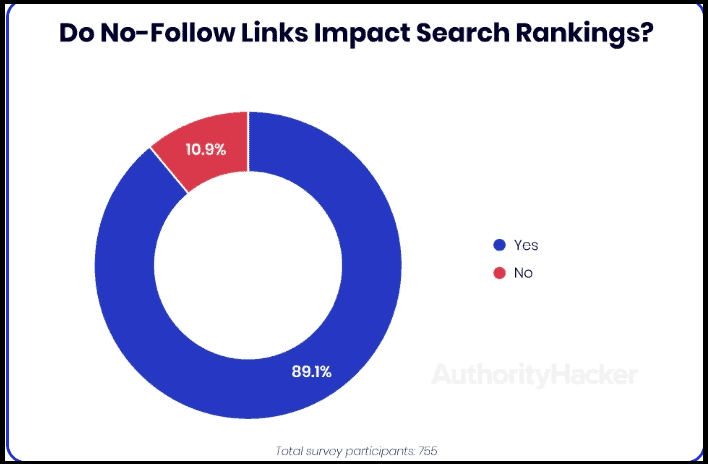
A natural link profile should have both dofollow and nofollow links.
👉 You may want to check more backlink statistics here.
How to Create Links
When you are building links, you can:

Manually Add Links
This category includes all those sites where you can add your link alone and independently.
Take, for example:
These types of links tend to have a low value for Google.
So, be careful not to overdo it, as they can often be marked as SPAM.
However, some of them can still be worth it.
Business Directories
Don’t rush to add your website to every business directory you find, just to earn another link.
Think about the most recognized ones, which could bring you traffic and visitors interested in your business.
Local business directories are a good example to consider, and they can help you connect with business owners in your area.
💡 Have you ever tried GoogleMyBusiness?

Social Media Profiles
In general, you should always reserve the name of your business or brand on all major social media, such as:
- X (the former Twitter)
- YouTube
- SlideShare
Registering on each one is quick and easy.
And even if you don’t want to spend time on social media marketing, you should claim your name on these networks.
This way, you can avoid unpleasant surprises in the future (think of people who will want to steal your brand name once your business begins to take off).
Blog Comments
Consider leaving comments on blogs as a way to build relationships with other webmasters and their audiences.
Don’t think of it as a way to build links. You would just automate it and end up leaving useless comments.
Ryan Biddulph is a master of blog comments. He always adds fresh, positive, informative thoughts when he comments on other blogs:

👉 Try this practice. Enter the following query in Google:
“Your Keyword” + “Leave a Comment”
And you will find blog posts related to your keyword that allow commenting.
Aim to leave helpful comments after actually reading the article. Try proposing to add a specific topic to the writer, or constructively correct any errors you think you have found.
This way, not only can you drive traffic to your site, but you can also build a relationship with new bloggers.
Forum Posting
You can use relevant forums to share your knowledge, build an audience, and share informative content from your site from time to time.
Plus, most of the forums allow a link in the bio or user section.
Add value to the discussion, report examples, and suggestions.
✅ Don’t spam links here and there. You just risk being penalized.
Q&A sites
The same concept of forums also applies on Q&A sites, where you find users willing to ask questions about any topic.
Use these places to showcase your expertise and mention useful resources (like yours) from time to time.
The content you create can generate thousands of views over time.

Job Listing
Posting a job on a related site listing can be a way to get an easy link.
You can do this only if you are looking to hire someone.
When your online business is starting to grow, you may need an accountant, a writer, a graphic designer, or an assistant who can help with tedious tasks such as social media marketing or email outreach.
Ask for Links
This strategy includes all the practices needed to contact the webmaster and convince him to add your link to their page.
The compelling reason is essential to succeed in your intent.
So, you should make sure your content is interesting enough to convince them to consider adding your link.
To help you out, here are some of the strategies you can use:
- Guest blogging. You are invited, or you ask to contribute informative content on related websites.
- Email Outreach. Research for content that is in line with yours and asks to be included as a helpful resource.
- Ego Bait. You mention someone in your content, and hopefully, you can get a link back.
- Broken Link Building. You find a broken link in a related web page, and you ask to replace it with your content.
- HARO. Subscribe to the journalist platform and receive daily emails indicating topics, ways, and how you can contribute and get a mention in upcoming articles, news, and posts.
- Image Link Attribution. Research the web about your images and ask to place a credit where it is not properly displayed.
Sometimes these practices lead to positive results, but you will often get negative, not very encouraging, or frustrating responses. You can offer something extra like social sharing on your popular accounts or a mention in your upcoming newsletter. Don’t fall into the temptation to give a link in exchange or even money because you risk falling into what is considered “Link Schemes” by Google:

The truth is that to increase your chances of success, you must create content of real quality, which is better than competitors’ and which gives value to readers.
Earn Links
You can earn links when webmasters naturally mention your site and link to your articles (for example, when they refresh content).
This happens when you are an authority in your niche or when you manage to create beneficial, interesting, and informative content.
Here are some ideas you can use to achieve this:
- Visual Content. They can be images, infographics, diagrams, or any other media created with graphic software. Must be packed with data or interesting facts.
- Lists Posts. People like this type of article. They are digestible, quick to read, and with practical information to use.
- Original Research. You can create this type of content with data or surveys that reveal something new in your industry.
- Pillar Articles. These are the best kinds of content you can create. In-depth, informative, useful guides packed with a huge amount of information on a specific topic, with semantic SEO strategy in mind.
And it is what Google is suggesting too.

✅ Important note: unless you are already known in your industry, the content you just posted needs to be promoted.
Here are some practical tips:
- Use Quora. Share your knowledge and build an audience in your target niche.
- Create a Video. Something related to your article or that adds an extra. Post it on YouTube or Vimeo and your web page.
- Use Social Media. Share your content on Facebook, X (Twitter), Pinterest, or LinkedIn.
- Create an Infographic. This visual content can go viral easily if it brings real value to your industry.
- Use On-page SEO optimization. The correct implementation of these strategies will bring traffic over time.
- Create an eBook. You can use your best content or write something new.
- Use advertising. Think of AdWords, Facebook Ads, or the advertising of a network where your audience is located.
Best Link-Building Strategies
In the previous section, you learned about different ways to create links.
Now, let’s see in detail a few popular, actionable link-building strategies:
💡 Do you want to read more ways to build links? Visit:
Guest Blogging
Here are a few things to keep in mind while creating the perfect guest post:
- Study the editorial calendar of the website to post on.
- Identify the style, the tone of voice, and the topics that work.
- Propose a minimum of 3 titles.
- Read the rules imposed on guest bloggers.
- Deliver a complete, proofread, perfect text. Remember the quality.
- Add internal links. Send images, graphics, and videos.
- Take care of formatting.
- Interact with commenters once the content has been published.
So, do you want to write a guest post? You have to give your best.
Contact the blog owner and agree on the title.
Work on all the aspects, from WordPress SEO to image optimization.
Treat the post as the best article you will publish on your blog, and don’t skimp on the attention (even more, if you are going to guest post at popular websites in your niche).
Finding blogs that accept guest posts isn’t hard. Just use the proper Google search operators to locate sites that publish articles.
For example, try searching for:
- “guest post” + “your keyword”
- “write for us” + “your keyword”
- “submit guest post” + “your keyword”
After finding some related websites, study each one thoroughly, and assess consistency with the topic and the general quality of the content.
To do so, keep these points in mind:
- Is there a lot of advertising?
- Are you addressing the same topic?
- Are the updates constant?
- Does it have a lot of quality inbound links?
- Are there any noteworthy comments?
Once you think a website could work for your guest blogging campaign, it’s time to reach out.
Here’s a template you can use:
Hi [Website's Owner],
I hope this message finds you well [or Different Greeting].
My name s [Your Name] and my blog is [Your Website].
I have just read [Post Title], after researching for [Keywords or Topic].
You have written a very interesting and informative article!
I also write about [Keywords or Topic] and I think I could contribute to your website with a useful guest post for your readers.
Here’s an example of my writing: [Your Best Post URL]
What about any of these titles:
[Title 1]
[Title 2]
[Title 3]
Thanks for your time and consideration!
I can’t wait to hear back from you.
Best,
[Your Name]
[Your Website]See? It’s pretty customizable.
Just copy the message and edit any section to fit your needs.
Content Assets
I have already mentioned some of these in the previous chapter.
The principle is to build a noteworthy resource, which people are going to mention and link.
In the form of content, this resource can be:
- A collection of data
- An eBook
- A video
- An infographic
- An image
- A useful and in-depth guide
By creating them, you target a specific audience to communicate something informative, interesting, or entertaining.
Once they become aware of your content asset, people will be inclined to mention it whenever they create content related to the topic covered.
👉 Here’s a practical example.
First, research the topic. Then, you can create a study in the blogging industry.
You can ask a sizeable number of bloggers the same question, then collect the data and publish it.
Think of interesting things, like how much they earn monthly with their websites or the main methods of income creation.
The more specific you are, the more interesting the search will become and worth mentioning by users in your niche market.
Unlinked Brand Mentions
When someone mentions your name or brand, but without linking to your website, it’s called an unlinked brand mention.
You can turn these mentions into links by contacting the webmaster and inviting him to link to your pages.
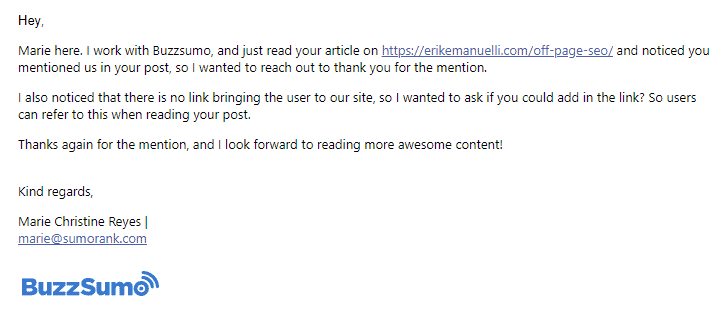
You should know that Google still values brand mentions, even if without links. And when linked, they provide more value.
The first step of this strategy is research. You can use any of these tools to look for mentions of your brand:
- Buzzsumo
- SemRush
- Moz Explorer
- Ahrefs
- Mention.net
- Google Alerts
You can search for the exact brand name (or any variation of it) and for any service, product, or tools you are offering.
If you have found several mentions, try to list them based on website authority.
After you have searched for the contact information, approach the staff or webmaster, asking to add a link.
Of course, be gentle and kind. Remember to thank them for the mention and then explain the reason a link addition will benefit their audience.
Here you can find a complete guide about blogger outreach with different templates and tools you can use to increase your chance of success.
Broken Link Building
Many websites have broken links (or else 404 errors). Sometimes, you can find them on high-quality pages related to your niche market.
Through the practice of broken link building, you contact webmasters by informing them about the broken link and asking them to replace it with yours.
It’s a win-win situation. You earn a link, and the webmaster can improve the user experience and SEO of his site.
Instead of setting up a redirect, they can replace the broken link with your resource.
✅ Here are the practical steps.
First, download the Check My Links Chrome extension:

Then, search for articles or resource pages based on your keywords.
Once you are on the page, you can check for broken links by clicking on the extension button.
Here’s an example of how it will look the result on the “search engine optimization” page on Wikipedia:

Once you have found a broken link on a specific page, you can contact the webmaster and ask to replace it with your awesome resource.
Here’s a script you can use:
Hi [Website's Owner],
just checking if you are still updating your website!
I have just read [Post Title], after researching for [Keywords or Topic]:
[Post URL]
You have written a very interesting and informative article!
However, I noticed that this link is not working:
[URL with Broken Link]
I recently published:
[Your Awesome Post URL]
It may be a perfect replacement for the broken link.
What do you think? :)
Thanks for your time and consideration!
And keep up the good work.
Best,
[Your Name]
[Your Website]You can edit each section as per your needs.
Just copy the template and add your information.
Competitor Link Analysis
This link-building method allows you to discover the backlinks of competing websites within your niche, through an analysis of their profile.
Tools such as Ahrefs, SEMRush, Majestic SEO, and Open Site Explorer allow you to analyze metrics, including page and domain authority.
But, how can you do this?
Simply follow these steps.
First, grab your keywords and enter them in Google.
The first results you see in the SERP are the URLs you can use.
Submit the URL to your favorite SEO tool and import the data in Excel, as a . CSV file:

Now, you have a list of the best links from your competitors that you can target.
The best news is that SEO tools have already:
- Filtered bad, spammy links
- Ignored weak links
- Listed the good links you can focus on
My Experience With Link Building
One of my favorite techniques has always been guest posting.
It was one of the first techniques I used to get backlinks from other blogs in my niche.
I wrote awesome articles and published them on popular websites.
The good thing is that consistency brought me to getting recognized by Google as an entity, earning a knowledge panel.
Are you curious?
👉 Simply Google my name+author, and you can see that the search engine is listing all my guest contributions or sites where I have authorship.
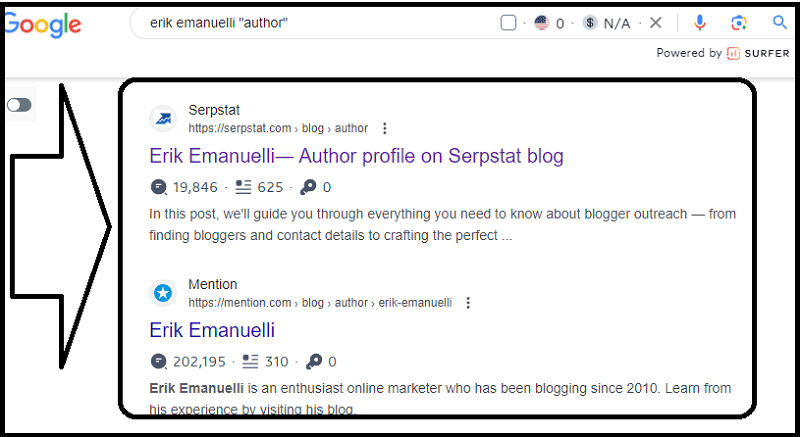
For example, one of my guest posts on ReadWrite has been picked up and syndicated by MSN (Microsoft Starter):
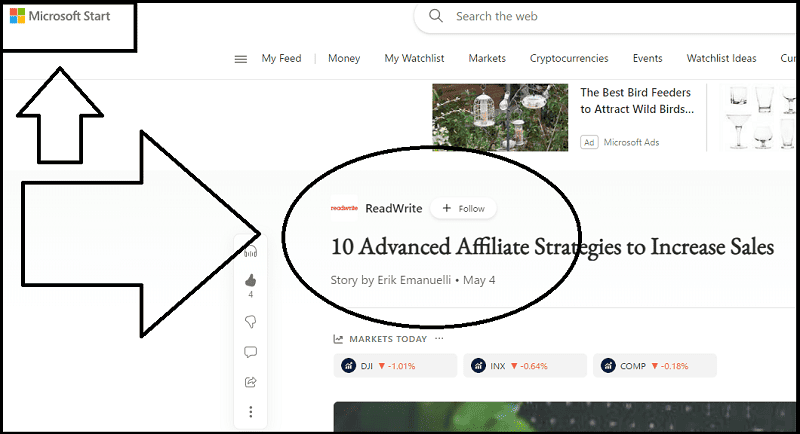
Pretty cool, right?
Also, another technique that I’ve seen working a lot is collaborating with other site owners (in the form of link exchange, without overdoing).
These relationships can be created through a simple email or Slack group like this one. That’s why it’s important to nurture connections, since the beginning.
Finally, I always recommend creating awesome, evergreen content.
It’s satisfying to earn links that way.
It is like Google’s John Mueller describes as:
“A good link… so I mean the traditional good link is someone who comes across your website and thinks it’s a fantastic website and recommends it to other people with a link.”
Link-Building FAQs
Q: What should you not do in a link building?
A: You should never use black hat link-building techniques. Also, avoid spamming directory submissions, and other low-quality tactics, such as:
- Excessive link exchanges
- Using the same anchor text for all your links
- Buying links
- Spamming blog comments
- Using link farms
- Automated software that generates thousands of links
And so on. For further reading, refer to the SPAM section of the Google Search Essentials.
Q: What are the most effective link-building strategies?
A: I’ve included some of the most effective link-building strategies in this article. Some of these include quality guest blogging, broken link building, and competitor link analysis. But, in the end, remember that the best links are the ones you earned from people who will read your content and will naturally link to it.
Q: Does link building increase organic traffic?
A: Yes, link building can increase organic traffic to your website. A high-quality backlink portfolio will not only improve the SEO of your website but will also attract more qualified visitors from other websites. These users can eventually be converted into customers.
Q: How harmful can a link be?
A: A low-quality link from a spammy website can be one of the most harmful ones. It can hurt your SEO, as well as your reputation. Avoid link exchanges and automated software that creates thousands of links from low-quality sources (and remember that you can always disavow them).
Q: How often should I check my backlinks?
A: You should periodically monitor your backlinks to make sure they are all still active and that none of your competitors has been able to outrank you. You should also check if any of your backlinks are pointing to a low-quality website or resource. If that’s the case, contact the webmaster and ask them to remove the link.
Q: How do you evaluate site quality for link building?
A: When evaluating site quality for link building, you should look at SEO metrics such as domain authority, page authority, and the total number of backlinks pointing to the website. Organic traffic and trends over time are good signs of a healthy website. You should also consider the relevance of the link, and if it is coming from a reputable source.
Before You Go
Thanks for reading this far!
And if you need more link-building ideas, don’t miss to read this monster list of 100 ways to build links:
Did you know that you can rank even without backlinks?
If you are curious, read this:
Now, it’s over to you.
Take action and begin earning quality links.
Good luck!
And don’t forget to share and comment if you liked the content.
Thank you!


Hi Erik,
Thanks so much for the shoutout buddy. What an awesome guide. Once again, a few genuine comments I published led to another backlink via your kind mention. But I do not comment to get these links and mentions; I comment to add value to blog posts, to make friends and to have fun connecting with other bloggers. Hold these intents and genuine blog commenting will take you to places you never dreamed of.
Ryan
That’s exactly how it should be, Ryan.
Comment for connecting, interacting and building relationships.
Thanks for taking the time to visit and leave your feedback.
I hope this link building guide is going to help some fellow bloggers.
Erik,
You are acting to the referral marketing process: know – like – trust.
It is time to do a catch-up chat soon! 😉
All the Best,
Martin
It’s time to give, Martin.
I’m very pleased to see you here.
Sure, let’s chat!
Impressive guide Erik. A refresher for veterans and a helpful manual for new bloggers.
Janice
Hi Janice,
thanks for your feedback.
I hope this link building guide will help many bloggers.
I enjoyed this article as I always receive freelancers contacting me for link opportunities and it is something I don’t know as much as I would like to but appreciate all of the information.
Thanks Lynne,
spread the word about this post!
Hi Erik,
This is just a helpful guide for every new blogger. It’s impressive how you have explained basic link-building practices. Good work!
Arfa
I’m glad to see your comment here, Arfa and I’m happy to hear your positive feedback.
There’s so much to learn from each topic, right?
I’m sure I’ll be able to add more information and update the article in the future.
Thanks for commenting!
Hi Erik,
What an amazing share/guide on link building, I am following some of the strategies mentioned in this very religiously especially the one on posting a genuine and related blog comments after fully reading the content, as you mentioned about Ryan in the Content a best example for this.
But the Broken link building is, I think it’s a waste of time , most often the other side just ignore it. This is my experience. Any ways it sometimes work, depending on the contents and the person you approach.
Thanks Erik, in fact I retweeted this but forgot to write my feedback.
Keep sharing
All Good Wishes from Philipscom Views Secunderabad India
I think it depends on your approach of email outreach and the content you’re targeting, Phil.
Thanks for sharing your positive feedback, really appreciated it!
Hi Erik, it’s an amazing tutorial for link building. You explained each point very well.
Yes, DA will help you to determine the strength of website.
Getting links from relevant sites is important. quality links also important.
Definitely bloggers have to take care of link building. This is the open post for bloggers.
Thank you Erik for this epic guide. Keep post such helpful content here.
Thanks for visiting and sharing your comment, Venkat.
Glad you liked the guide. 🙂
Hi Erik,
Thanks for sharing this helpful Guide. I really appreciate it
Good to hear it, Rosa.
Hi Erik,
Link building is always a challenging task. I always look for the strategies that work to create high quality links.
Your in-depth article about link building helped me out to create some useful backlinks.
Thanks for updating us with such an informative post.
-Nitin Dabas
Thanks for the positive feedback, Nitin.
Really appreciated. 🙂
Hey Erik,
How’s it going, buddy? What an excellent and easy to follow guide. I’m not an SEO per see but after a decade as a freelance website developer (and now a returning newbie blogger) I have gleaned a bit of knowledge in the area and especially working with people like Ryan, Janice and Debi Norton over the years.
Have you checked out Matthew Woodward’s blog yet? It’s an excellent resource and well worth a look.
One last idea I have been using this past couple of years is Snail Mail. I have gained quite a few new clients from that as no one seems to do that method anymore.
There is something quite special about sending a receiving a handwritten letter in the post these days and it tells the prospective client about your work ethic. Anyone can write an email, hand out a business card or @mention someone on Twitter but spending time writing a letter, well that’s something else and could end up with not only a lucrative client but some excellent link juice.
It was good to be here Erik.
Phillip
Hey Philip,
I can’t complain!
What about you?
Thanks for sharing your feedback on this link building guide.
It’s refreshing to receive such a positive comment.
Yes, I know Matthew Woodward’s blog. I subscribed to his newsletter and I have read some of his tutorials. Great content!
What a nice strategy the Snail Mail. I think I should try it to making some outreach to important names in the online marketing industry.
Thanks for sharing this idea and talk soon!
This is merely a useful manual for all bloggers. It’s impressive how clearly you’ve outlined the fundamentals of link development. Good work! Thank you for your wonderful info.
Good to hear you learned something from this link-building guide.
Thanks for the positive feedback, Samuel.
Your work is excellent, and I really liked reading your article. Post frequently. Many thanks.
Hi William,
thanks for the positive comment.
Hi Erik,
This is just a helpful guide for every new blogger. It’s impressive how you have explained basic link-building practices. Good work!
Hey Jack,
I’m glad you liked this guide.
Thanks for the good comment!
Hey Erik.
Your content is always on point. Very informative and easy to follow.
Thanks for this.
Thanks for your feedback, Winfred.
Hi Erik,
This article was incredibly helpful with all of the advance link building tactics. Thanks for sharing such a varied list of link building techniques! Brilliant when you need some inspiration and help with your SEO process.
Hi Kas,
glad you enjoyed the content.
For more link-building ideas, you can check this guide:
https://erikemanuelli.com/link-building-strategies/
The concept of link-building remains alien to me; I still don’t know what it’s all about. I would love to find out more and more about the same though.
Hey Greg,
you may want to check this guide too:
https://erikemanuelli.com/link-building-strategies/
I also truly want to know about is really comment Backlinks really work? Your post is very helpful to know about some important thing that I need to know..thanks
Hey Dilshad,
as mentioned in the article,
you should consider leaving comments on blogs as a way to build relationships with other webmasters and enthusiasts in your niche.
Don’t think of it as a way to build links. You would just automate it and end up leaving useless comments.
Connections in online business is everything!
Wow… this post is a wealth of information! The part about doing a Google search for “Your Keyword” + “Leave a Comment” to find blog posts related to your keyword that allow commenting is gold! I’m going to have to try a few of these strategies for gaining backlinks. Thanks so much for sharing!
Hi Briana,
glad to read you learned something new from this link-building guide.
I just visited your blog,
I like the design! And as a travel lover, I find your content really interesting! 🙂
Fantastic article on link building! I appreciated the emphasis on creating high-quality content as a foundation for successful link building. It’s so important to have a solid content strategy in place before focusing on acquiring links. Your tips on finding link opportunities and building relationships with other websites are also valuable and will definitely help to improve a website’s link profile. Thank you for sharing your expertise and providing practical advice for anyone looking to improve their link building efforts. Keep up the great work!
Thanks for the positive feedback, Abu Bakar.
Hi, Erik,
This is a great piece of information on link building.
You’ve shared lots of tips and tactics for building effective whitehat links.
While many SEOs believe links from blog commenting do have little to no impact anymore, I love that you include it on the list.
Blog commenting is still an integral part of brand awareness and relationship building, and the links can still pass business value, establish relationships, network, and help with SEO.
Thanks for sharing your experience, Erik; nice read.
Hi Shamsudeen,
I consider blog commenting as a way to build connections, not only links (which are, most of the times, nofollow).
Thanks for sharing your positive feedback on this guide!
Erik, you write such great and in-depth guides. I learned a lot from this, as I tend to always with your posts. Competitor link analysis is one backlink building technique I’d never heard of before and a really good idea. I really like the idea of pursuing unlinked brand mentions. I’m definitely going to look around to see if I can find any unlinked mentions. Thanks for the detailed and clear explanations here. 🙂
Some of those strategies require the use of tools like Semrush or Ahrefs, but there are many other link-building techniques that could be done without any (paid) tools.
I’m really happy to hear your positive comment on my posts.
It means a lot to me! 🙂
Link building is the main part of SEO. Without good link building strategy you are not able to get good SERP in Google.
I really impress with your points you shared in your post.
Hey Vikas,
did you know you can do SEO without link building?
https://erikemanuelli.com/seo-without-link-building/
Link building is a big part of SEO. You cannot get a good SERP in Google without a good link building strategy.
For certain queries, it is possible to rank high on Google WITHOUT any link building:
https://erikemanuelli.com/seo-without-link-building/
🧐
Thanks for sharing such a useful information. All the points you mentioned in the above post are very important. I was facing link building issues, I will try to follow up these points and I do hope I will get good results. Thanks again!
Glad to help, Shaheen.
Solid guide with clear, updated tactics. Appreciate how you focus on earning links naturally, not just chasing numbers. Good stuff!
Thanks for the awesome feedback, Ali.